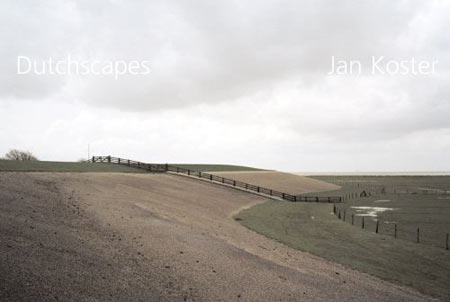Review: Dutchspaces by Jan Koster
 Beauty is most commonly associated with landscapes that have something obvious to offer: We want to be wowed. Everything else is “boring”. We don’t have time for that. Of course, whether we are doing ourselves a favour by constantly demanding to be entertained or at least tickled is not quite so clear: Aren’t we setting ourselves up like a bunch of junkies, always looking out for the next trip?
Beauty is most commonly associated with landscapes that have something obvious to offer: We want to be wowed. Everything else is “boring”. We don’t have time for that. Of course, whether we are doing ourselves a favour by constantly demanding to be entertained or at least tickled is not quite so clear: Aren’t we setting ourselves up like a bunch of junkies, always looking out for the next trip?
A book containing landscapes taken in The Netherlands sounds like the perfect antidote to a world looking for the next crazed experience. The country usually does not come on top of lists of the most beautiful places on Earth: It doesn’t have any mountains or canyons, and while it has a fair amount of coast, there are no rocky cliffs to be had, nor are there endless sunny beaches (I know there are beaches, but when people are talking about endless sunny beaches they usually have the Seychelles in mind). Superficially, it’s quite a “boring” place, a lot of rather flat land behind dikes, which literally guarantee the existence of the country, since large parts are below sea level. There are lots of windmills and tulips (the season permitting), but those really only invite the production of cliche photography. In other words, The Netherlands are the perfect place for a subdued experience of landscape.
Jan Koster’s Dutchscapes (published by Jap Sam Books; note that while the Amazon page talks about a “Dutch edition” the one I’m reviewing is English - I’ve noticed this problem with Amazon before) provides just that: A beautiful selection of rather stunning Dutch landscapes (many of them diptychs). Dutchscapes
requires the viewer’s careful attention, since its photographs’ beauty is very subtle. The images are very quiet, but they are carefully composed so that what might appear to be boring in fact reveals a deeper beauty, with often very small variations in colour. Large parts of these landscapes show the hands of humans trying to fend off the sea that otherwise would simply swallow the land; and upon studying those structures, they reveal the ubiquitous anonymity we know so well from concrete parking garages, say. But you have to look carefully, since nothing will immediately grab your attention. Dutchscapes
is a book that allows discoveries, a book that does not rely on gimmicky superficial beauty. And it does pay hommage to the beauty of the Dutch landscape.